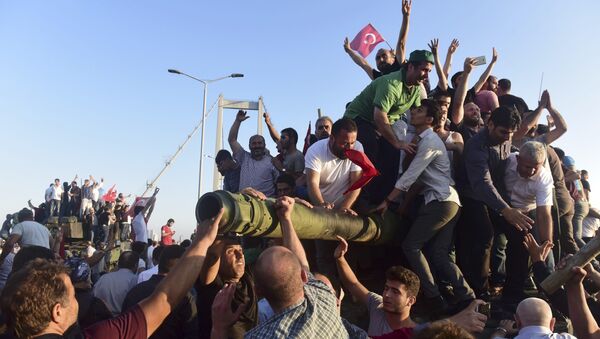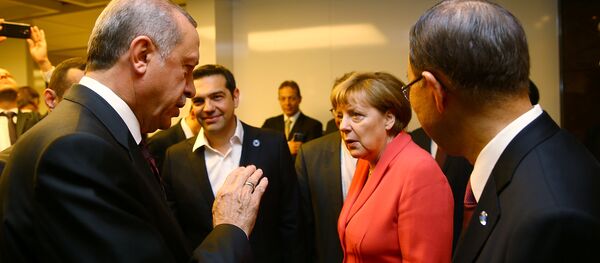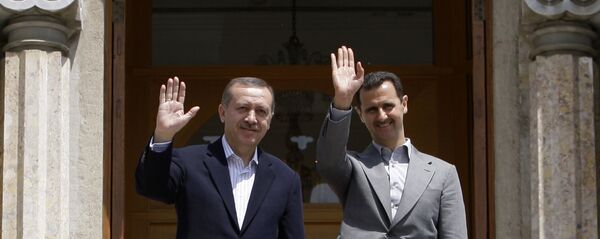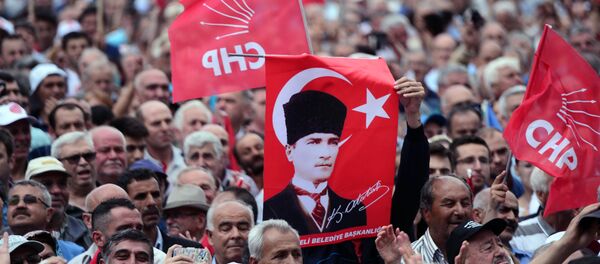Turkish President Recep Tayyip Erdogan's statement regarding the possibility of reinstating the death penalty in the country has added fuel to the fire.
European and American policymakers have voiced their concerns regarding the ongoing crackdown.
In her latest phone call to Erdogan, German Chancellor Angela Merkel called upon the Turkish leader to act with respect to the rule of law and warned that the revival of capital punishment in Turkey would be "in no way compatible with the goal of EU membership."
For his part, US Secretary of State John Kerry warned Ankara that the arrest spree could threaten its membership in NATO.
"We will certainly support bringing the perpetrators of the coup to justice, but we also caution against a reach that goes well beyond that… NATO also has a requirement with respect to democracy," Kerry told reporters Monday during a joint press conference with European Union foreign ministers in Brussels.
"Being part of a unique community of values, it is essential for Turkey, like all other Allies, to ensure full respect for democracy and its institutions, the constitutional order, the rule of law and fundamental freedoms," Stoltenberg wrote.
"I once again condemned the attempted coup in Turkey and reiterate my full support for Turkey's democratic institutions," he stressed, adding that Turkey remains a "valued NATO Ally."
Commenting on the matter, Con Coughlin of the Telegraph suggested that Erdogan's actions may give NATO no choice but to expel Turkey from the bloc.
Since 1952, when Turkey joined the Alliance, the country has been regarded as a "vital bulwark" in the defense of Western interests in Eurasia against the USSR and its allies in the Arab world.
"Turkey's pivotal geographical location is also the reason the US airbase at Incirlik in southern Turkey remains home to NATO's largest nuclear weapons facility," Coughlin remarked.
"So the fact that Washington now talks openly about the possibility of suspending Turkey's NATO membership shows just how badly relations between Ankara and its Western allies have deteriorated since last week's ill-fated military coup," the journalist stressed.
"Then Washington faced a major security alert after the Turks cut the electricity supply to the Incirlik base, a potentially disastrous development given the sensitivity of the munitions that are stored there," he underscored, in reference to the 50 B61 hydrogen bombs stockpiled at the base.
The question arises whether NATO is really serious about sacking its "difficult, but valuable, ally" if Erdogan's actions will contradict the bloc's membership's requirements.
In his interview with Sputnik, Lawrence Wilkerson, former chief-of-staff to US Secretary of State Colin Powell, noted that Turkey and President Recep Tayyip Erdogan's turn to the Islamic world spell trouble for NATO.
"Turkey is a very dicey character right now and has no business being part of NATO. Rather than be a part of Europe, it wants to be part of the Islamic world that we are having trouble with right now," Wilkerson told Sputnik.
However, there are voices claiming that the fuss about Turkey's NATO membership is just "much ado about nothing."
Commenting on Kerry's remarks, Akbar Shahid Ahmed of the Huffington Post writes:
"This was tough talk. It made headlines and news alerts almost immediately. But it's important to remember that there's little chance of anything beyond talk on the NATO membership question."
"At most, the US and other NATO partners will use the alliance's stated rules as yardsticks — noting that every so often, after a fresh Erdogan excess, that he's coming perilously close to crossing the line and violating commitments his country has signed," the journalist emphasizes.
Ahmed referred to NATO's history with Turkey, stressing that there were plenty of coups in Turkey's past which led to "multiple periods of repressive military dictatorship." However, what was constant amid the change in leaders was Ankara's NATO membership, he underscores, dubbing it "a pragmatic product of the West's Cold War priorities."




